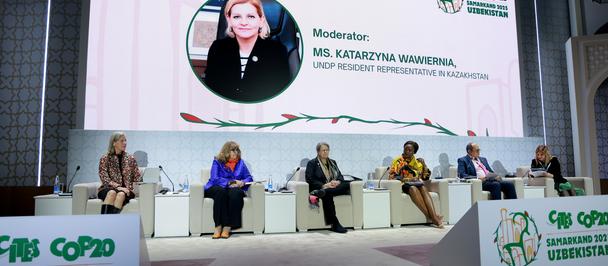Over the years, the climate on Earth has changed considerably. Climate change can generate not only negative changes in the natural environment, becoming the main cause of the reduction of biological diversity, but also affects all aspects of human life. These changes and human actions reduce natural ecosystems, decrease the population of animals, and change the composition of soil and vegetation cover.
All natural transformations impact the Kazakhstan’s forest ecosystems as well. The country’s forests cover an area of 12.5 million hectares and are home to thousands of species of animals and plants that play an important role in the country's ecosystem. However, the negative impact of climate change and human activities can already be reduced. Humanity has a real opportunity to achieve significant results in the conservation of nature and use the modern techniques of monitoring ecosystem resources.
Since 2018, the United Nations Development Programme (UNDP), the Global Environment Facility (GEF), jointly with the Government of Kazakhstan, have been implementing the project, which is aimed at the conservation and sustainable management of key globally significant ecosystems to address the loss of biodiversity and ecosystems. One of the key objectives of the project is to improve the quality of monitoring methods and protection of the state of forest ecosystems and biodiversity. That is why UNDP works actively in specially protected natural areas (SPNA) at the project implementation places.
In the fall of 2020, UNDP handed DJI Mavic 2 Pro drones with additional accessories to the inspectors and researchers of the West Altai Nature Reserve of the State Institutions "Fir Forestry" and "Ridder Forestry». The drones will improve the quality of monitoring and protection of the territory, which will subsequently have a positive impact on the activities of pilot natural areas.
In total, within the framework of the UNDP-GEF project 14 pilot protected areas of eight State forestry institutions of Kazakhstan received drones with additional accessories. Thanks to this, specialists of Natural areas have an additional opportunity to create photo plans and panoramas of the surrounding landscapes, which are necessary not only for monitoring purposes, but for counting animals, preventing fires and other natural disasters.
To date, UNDP-GEF project, which focuses on the conservation and sustainable management of important globally significant ecosystems, is one of the key projects for the conservation of biodiversity and forest ecosystems. It is important to remember the Earth's biodiversity is not only the World heritage, but also the responsibility of humanity, that we have to keep.

 Locations
Locations




